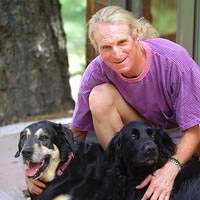Speakers at Social Events
Last modified: 21/01/2008
 |
Marc Bekoff
University of Colorado
Animal passions and beastly virtues: minding animals and increasing our compassionate footprint
Research in cognitive ethology, evolutionary biology, and social neuroscience, along with common sense, clearly shows that animals are emotional and empathic beings and that they display moral sensibility. What we observe when animals interact with one another tells us a lot about what's happening inside their heads and hearts. Animals' lives are very public, not hidden, private, or secret, and the privacy of mind argument that we can never know what animals are thinking or feeling is over-used and goes against solid arguments based on evolutionary continuity. It's not that difficult to assess the emotional state and well-being of animals. I'm incredulous that some skeptics actually question whether animals feel anything (and even if they think).
To make my case about animal morality, what I call "wild justice", I will focus on the details of social play behavior - the many ways in which animals play fairly and honestly. When animals play they carefully signal their intentions to cooperate and to play, they trust that playmates will obey the rules of fair play, and they forgive and apologize to one another so that play can continue as play and not escalate to aggression. Individuals fine-tune their interactions "on the run" by paying attention to what is happening from moment to moment.
We owe it to all individual animals to make every attempt to come to a greater understanding and appreciation of who they are - emotional, empathic, and often moral beings. When we're not sure about what they're feeling, we should leave them alone. Quite often "good welfare" isn't "good enough". We can always do better. By minding animals we can increase our compassionate footprint and make the world a better place for all beings.
|
 |
Vilmos Csányi
Eötvös University, Department of Ethology
How to be a good dog
Vilmos Csányi is one of the most respected ethologist who has experimented with dogs, wolves and their owners for years. He also wrote several books, among them If Dogs could Talk (Wenn Hunde sprechen könnten... in German), Changing Visions, Human Cognitive Maps: Past, Present and Future, Evolutionary Systems and Society: a general theory
|